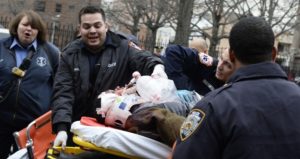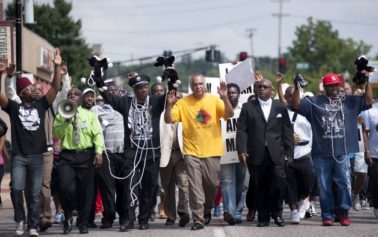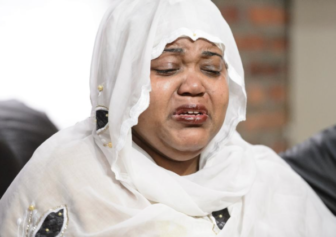The portrait emerging of Ismaaiyl Brinsley—the man who reportedly shot and killed two New York police officers in Brooklyn before killing himself on a subway platform—is that of a troubled young man who was estranged from most of his family after a transient, unstable childhood, failure in school and mental health challenges.
It is a picture that could describe many African-American young men in the United States, but in Brinsley’s case something pushed him over the edge, making him believe that violence was an answer to his problems. He chose to target both his on-again, off-again girlfriend, conceivably one of the people closest to him in the world, and then two random police officers he did not know at all.
The city was so much on edge after the murders of Officers Wenjian Liu and Rafael Ramos that police told the New York Post there were more than a dozen reported threats of violence against officers—including a man who burst into a Harlem station house screaming he wanted to kill everyone inside.
“This has been spinning out of control, and there’s going to be more violence,’’ former NYPD Detective Richard Sica, who investigated the 1988 slaying of Officer Eddie Byrne as he sat in his cruiser in Queens, told the Post. He added that Ramos, 40, and Liu, 32, “were targeted and assassinated just like Eddie was”— simply for being a cop.
“It’s not even close to being over,” Sica said.
Now forces ranging from former New York Mayor Rudy Giuliani to columnists in the New York Post are trying to twist the media narrative to place the blame for the cop shootings at the feet of the protesters in New York and across the nation who have been displaying their anger and outrage over police excessive force and the decisions by grand juries not to indict officers in Ferguson and New York for killing two unarmed Black men. Giuliani—at one point considered a Republican presidential candidate—even went so far as to blame President Obama, who has said he supported peaceful protesters.
It is a curious twisting of logic to blame protesters responding in anger to police killings for the violence brought by Brinsley—rather than blaming the police killings themselves.
Media profiles of Brinsley’s final hours indicate that he wanted to draw some attention to himself with his violent acts. After he shot his ex-girlfriend Shaneka Thompson, 29, on the stomach in Baltimore and boarded a bus for New York, he stopped two men on a street corner in Bed-Stuy and talked to them, Robert K. Boyce, the Police Department’s chief of detectives, told reporters at a news conference on Sunday. He asked them what gang they belonged to and then he told the men they should follow him on Instagram.
‘He then said, “Watch what I’m going to do,”’ Boyce said.
It is a emblem of our times that we should look to social media to peer into the mind of a man who committed such a high-profile crime. In a previous era investigators might pore through his belongings and speak to family members and acquaintances to find motivations. While they still do those things, now the footprints of his mindset are right there on his social media accounts, publicized for the whole world to see.
“Most of his postings and rants are on the Instagram account, and what we’re seeing from this right now is anger against the government,” Boyce said.
Boyce said one of Brinsley’s posts showed a burning flag, and in other posts he talked about his anger toward the police. In addition, the account contained “other postings as well, of self-despair, of anger at himself and where his life is right now,” Boyce said.
In one of his final Instagram posts, Brinsley put up the message, “I’m Putting Wings on Pigs Today,” and “They Take 1 Of Ours … Let’s Take 2 of Theirs.” The post ended with the words “This May Be My Final Post.”
Another post was accompanied by a picture of a silver automatic handgun with a wooden handle—with the hashtag RIP Eric Garner and Mike Brown. An Instagram picture of Brinsley’s pants and sneaker was accompanied by what appear to be lyrics from a song by 50 Cent called “Green Lantern.”
“Never had a hot gun on your waist and blood on your shoe…n*gga you ain’t been through what I been through… you not like me and I’m not like you” were the words written on Instagram that are almost identical to a 50 Cent song about a cold-blooded killer who is “gangsta to the core.”
Brinsley clearly held anger toward the police that could have come from his many interactions with them during a past that police said included 20 arrests, mainly for petty crimes like stealing condoms from a Rite Aid drugstore in Ohio, according to the Times, which also said Brinsley spent two years in prison after firing a stolen gun near a public street in Georgia.
New York police said they were told by Brinsley’s relatives that he was taking medication for mental illness and unsuccessfully had tried to commit suicide by hanging himself last year. The Times reported that when Brinsley was asked during court hearing in August 2011 court whether he had been a patient in a mental institution or under the care of a psychiatrist or psychologist, he said he had.
“In his short life, during which Mr. Brinsley failed to finish high school, to hold a steady job or, seemingly, to commit even the smallest crime without being caught, thoughts of revenge seemed to be the one thing giving him purpose,” the Times reported.
As for his early life, media reports indicate there was much instability, moving in with different relatives, dropping out of a New Jersey high school in the 10th grade, infrequent visits with relatives. He was even feared by his own mother, who lives in Brooklyn and had not seen him in a month, according to police.
She said “he had a very troubled childhood and was often violent,” Chief Boyce said.
Meanwhile, as police officials turned up the angry rhetoric directed at Mayor De Blasio and even President Obama, who they believe have shown too much deference and respect for the protesters, the family of one of the slain officers indicated they weren’t interested in the blame game. According to the Post, Patrick Lynch, head of the Patrolmen’s Benevolent Association, last week asked officers to sign a petition that would prohibit the mayor from attending their funerals if they were killed in the line of duty, but a cousin of Ramos said the mayor was welcome at his funeral.
“He could come (if he wants),” Ronnie Gonzalez, 54, a cousin, told the Post. “We’re not disrespectful. We’re not going to throw him out and say don’t be here. If he wants to come and show us some support, by all means we will accept that.”



